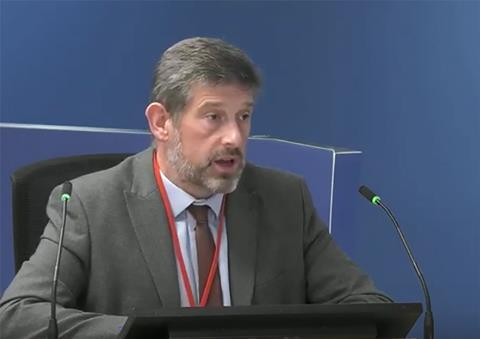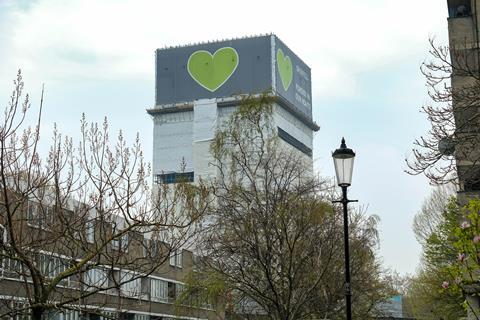Products firm targeted Judith Hackitt, Clive Betts and Amber Rudd casting doubt on non-combustible products
Kingspan commissioned and deliberately “gamed” tests on competitors’ insulation in order to “plant seeds of doubt” in the corridors of power about the safety of non-combustible materials after the Grenfell fire, the inquiry heard yesterday.
It was told the Irish construction giant also hired a leading firm of political lobbyists straight after the tragedy in a bid to influence key decision-makers including ministers and Judith Hackitt in an attempt to discredit rival products and avoid a ban on combustible materials.

Kingspan’s technical and public affairs director Adrian Pargeter denied they rigged the tests but admitted they had deliberately set them up to perform poorly as part of a “political engagement plan” which was enacted with the knowledge of Kingspan’s billionaire chief executive, Gene Murtagh.
The revelations came on what unexpectedly turned out to be the last day of the Grenfell Inquiry this year.
Inquiry chairman Martin Moore-Bick abruptly interrupted barrister Richard Millett QC mid-sentence yesterday afternoon to announce that a member of staff had tested positive for covid-19, that several colleagues would now have to isolate and that there was no way to keep the inquiry running without them.
Earlier Millett accused Kingspan of “attacking the opposition for market share reasons” and asked Pargeter: “Did you see the aftermath of the Grenfell Tower fire as something of a commercial opportunity?” to which he replied: “Absolutely not.”
The inquiry heard that within six weeks of June 2017’s fire which killed 72 people, Kingspan – whose combustible Kooltherm K15 insulation was used on parts of the tower despite not being specified – had hired Portland Communications.
The firm drafted a document for Kingspan by August stating: “It’s time to get our message out to the people that matter. In the first instance, initial outreach should be made by Kingspan and not by Portland. It looks better. We will draft letters and emails on your behalf, we will ensure each one is tailored to the recipient, and we will prepare you adequately for each and every meeting that you are granted. Portland will be the engine room. We must be realistic though: some people will not want to meet you and they will not want to be lobbied. But there is still immeasurable value in getting Kingspan’s manifesto in front of these decision-makers.”
The list of targets Portland suggested included the then home secretary Amber Rudd, housing secretary Sajid Javid and Dame Judith Hackitt, who had just been appointed to conduct her review of Building Regulations and fire safety.
The list also included Clive Betts, chair of the communities select committee, fellow committee member Helen Hayes, a former Allies & Morrison staffer turned MP, and former housing minister Mark Prisk, then a member of the housing and planning select committee.
They were repeatedly asked for meetings by phone, email and letter with the help of Grayling, another lobbying firm that replaced Portland.
Pargeter agreed with Millett’s assessment that it was “a pretty carefully orchestrated campaign across a wide front with a number of extremely powerful and important stakeholders”.
Kingspan wanted to convince them that “combustible materials are no more dangerous than non-combustible materials when improperly installed” and that they should not be banned. It also wished to force full-scale tests on its competitors which were relying on the much cheaper “linear route” to compliance with Building Regulations.
Millett asked: “Kingspan… was doing its best to ensure that the science was secretly perverted for financial gain. That is the position, isn’t it?” Pargeter replied: “That’s not the position at all.”
The inquiry was shown an internal email – copied to senior management including Murtagh – which revealed Kingspan had “discussed how we can generate evidence for use in both the political arena and with the Hackitt Review team”.
The inquiry heard that Kingspan commissioned three tests of rival Rockwool and Vitracore products in 2018 in an effort to discredit the “linear route” – in which a product consists of compliant elements so does not require a full-scale fire test to prove compliance with Building Regulations.
All three failed but Millett alleged Kingspan had deliberately set the tests up to fail. Pargeter rejected this but admitted they had created “a worst-case scenario” for each product.
An internal document described how one test was to be set up: “The panel system as drawn is expected to perform badly in spite of being A2 as it relies on bonded stiffeners and extrusions for its structural stability. The panel is not fixed on its vertical edges and the bonded connection are expected to deteriorate and fail quickly in the BS8414 test. The way the internal corner is detailed will allow the flames to bypass the vertical cavity barriers and attack the cavity of the wing wall.”
The results were sent to Clive Betts as part of his committee’s inquiry into the Hackitt review, a submission which Millett described as “a deliberate attempt to deceive”.
Kingspan’s covering letter said: “Our position is not about commercial benefit but about ensuring that Building Regulations are always rooted in science and engineering.”
Millett said: “I’m going to suggest to you that, on what we’ve looked at, Kingspan was engaged in a wholesale attempt to mislead Clive Betts and the select committee into having doubts about the linear route to compliance because of the threat of the ban on combustibles based on a deliberately manipulated test; that’s right, isn’t it?” Pargeter replied: “No, it’s not.”
A little later Millett said: “There you are in mid-2018, in the aftermath of the Grenfell Tower fire, presenting evidence to the select committee which was gamed.” Pargeter responded: “That’s not correct.” He insisted the tests represented potential real-life linear systems.
The inquiry heard that as a result of Kingspan’s evidence to the select committee, the communities department wrote to its chief executive, Murtagh, asking him to hand over Exova’s full report into the Vitracore G2 test along with remaining samples. It said ministers were working “as quickly as possible to establish whether there is a public safety risk in relation to this cladding, and to determine any action that should be taken to ensure public safety”.
Pargeter said he did not know whether Murtagh ever replied but the product was subsequently withdrawn from the market.

Millett alleged: “Kingspan’s position, even in 2018 in the face of a government investigation into fire safety after Grenfell, was doing its best to ensure that the science was secretly perverted for financial gain. That is the position, isn’t it? … And that had been your own approach and Kingspan’s general approach for years … And it’s still going on.”
Pargeter rejected each of these statements. He also rejected an accusation that he had used his Grenfell witness statement to “push the Kingspan line” through the inquiry by using it to argue against a ban rather than addressing what had happened at Grenfell Tower.
The inquiry will restart on 11 January next year when former Kingspan employee Richard Burnley will resume his evidence.











No comments yet